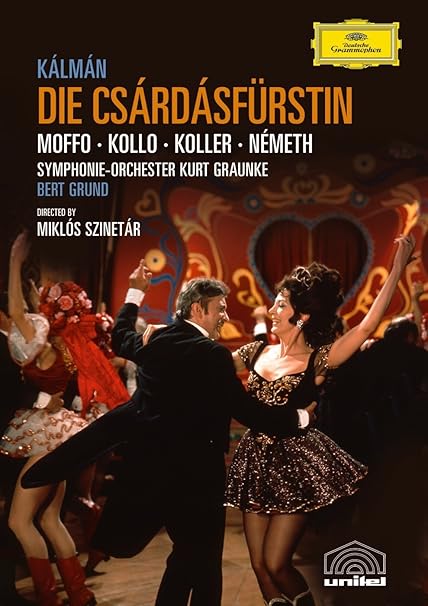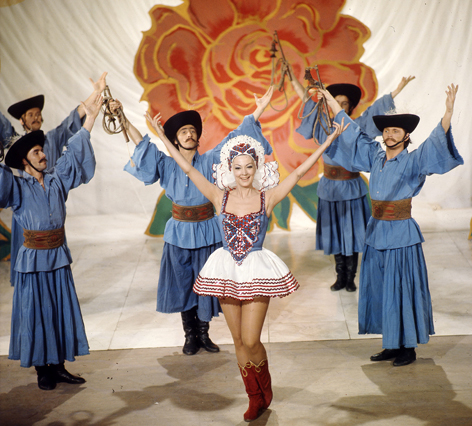Csardasfuerstin

Last night I watched Kalman's Csardasfuerstin in a 1971 cinematic production directed by Miklos Szinetar and filmed on location at Budapest featuring Anna Moffo as the leading lady. The show first appeared in 1915 and appears to be set in the peaceful years just preceding that time.
The story
The plot is on a familiar theme -- class distinctions. Can a nobleman marry a showgirl? It seems an insurmountable obstacle, particularly as the stepmother is most emphatic about its impossibility. That role must have been well cast as I suspected from the outset that the stepmother was herself an ex-showgirl -- which is of course revealed at the end. That revelation destroys the stepmother's objections so we end up with the two happy couples that we expect of operetta
The ending has to be one of the best in operetta: Lots of belly-laughs and great happiness all round. The three old admirers bouncing along in a first-class railway carriage was a great scene.
A very small point: Kalman in this show has his leading lady singing passionately about her mountain home -- which also happens in Benatzky's Im Weissen Roessl: Surprising to me but perhaps not to others. I actually grew up with mountains looming over me (Bartle Frere and Bellenden Ker, since you ask) but I appear to be deficient in my adoration of mountains. I rather liked the Gordonvale pyramid, though.
The cast
I was not much impressed by the casting. Rene Kollo is a most distinguished tenor but his appearance in his early 30s in the show (he is now 77) as leading man looked inappropriate to me. He had at that age rather effeminate and sullen looks IMHO. I am used to big operetta productions featuring manly-looking men such as Herman Prey, Eberhard Waechter and Rodney Gilfry. So it was a bit difficult to relate to his character.
And although the late American soprano Anna Moffo was impeccable as both an actress and a singer, she looked lamentably flat-chested. So seeing her as an object of infatuation was difficult -- for me, anyway.
Moffo

Moffo on tour
I was not expecting such shapely singers as Zabine Kapfinger (Moerbisch 2008) and Ute Gfrerer (e.g. Zuerich, 2004), though. I am for instance quite entranced by the very feminine Hamburg soprano Anja Katharina Wigger (e.g. at Moerbisch 2008) even though she is rather small in the bust, but she does have SOME bust.

Wigger
And the 1973 cinematic version of "Eine Nacht in Venedig" with Václav Kaslík as Intendant managed to find three ladies who filled push-up bras very well. Operetta does need good visuals in my opinion.
There is no doubt that Moffo performed brilliantly. She matched her facial expressions and body language to the situation very well throughout. I think her American background was very enabling when she expressed cynicism. As a non-American, I may perhaps be in a position to note that American women are exceptionally cynical. They are of course cynical for good reason. American men lie so often to them.
And Moffo's singing was impeccable, of course -- a strong and faultless voice. And she was a lively dancer too.
But Dagmar Koller was the outstanding dancer. She did some very good high kicks in Wiener Blut but in the climax of this show she was everywhere, everyway and singing as well. She was however led by "Boni" (Sandor Nemeth) who could almost be described as a dancing machine -- hugely energetic, flexible, creative and lots of other adjectives. But she matched him. Very impressive.
Dagmar Koller as the second-string lady portrayed a good-looking and nice-natured lady very well. The scene where she immediately says Aber ja ("Of course") to a very rushed marriage proposal is amusing.
I do think that in operetta looks are more important than in grand opera and the more minor characters were in this case very well cast. The Prince (Karl Schönböck) looked very princely and was given very wise lines -- always agreeing with his wife, sort of.
And Miska the servant (Zoltán Latinovits) was a triumph. He got a lot of the laughs. His inability to reply with anything but "Jawohl Durchlaucht" ("Very well highness") was a classic. I liked his heel-clicking too.
The character of Oberleutnant von Rohnsdorff was well played and I was surprised that the character was not much developed. It could have been fun. His Roman style army helmet was impressive. I initially thought it was just an operatic joke but it appears that the Austro-Hungarian army officers did indeed wear such helmets. It certainly leaves the Prussian Pickelhaube for dead.

Given the time in which it was set, I was a little surprised (but pleased) that so many of the ladies appeared in mini-skirts. But in 1971 such skirts were in full fashion so it was the fashion of the day in which the show was performed that prevailed. Pleasing!
Other details
Kalman's music was of course good but no particular song stayed with me. The story was about a cabaret singer so the cabaret singing in the show was appropriate but I was glad there was some operatic singing too. With great singers such as Moffo and Rene Kollo on stage that had to be. There was a LOT of singing and dancing, which probably accounts, in part, for the popularity of the work. It was particularly popular in the former Soviet Union, though that may have been because of the social class issue.
I was a bit puzzled by the title of the show. I expected a mighty Csardas at some point in the show but it was not to be. It seems that "Csardas" is being used as a polite synonym for gypsy and that all showgirls are regarded as gypsies. So the reference is to a gypsy singer who eventually became a princesss. Pretty obscure.
Something that pleased me was the attempt made to re-create the motor vehicles of 1915. They looked quite grand though I doubt that they were precise replicas of any actual model from the past.
"Jawohl" is an emphatic form of agreement in German. You hear it a lot in operetta. My long-ago High School German teacher (who was actually a Ukrainian) told me that the term had fallen out of favour in the military but I don't know if that still prevails. "Durchlaucht" is a princely title of a slightly lower rank than "Hoheit" (Highness). It had become rather common among the Austro/Hungarian nobility at the beginning of the 20th century
The more I watch Austro/Hungarian operetta, the more I feel that it sounds so much better in German. German sounds a more serious language or something. I even think and mutter to myself in German (probably not very good German) for a while after I have been watching it.
The original German is sometimes much more amusing than the subtitles. It is very succinct when the Prince refers to his marriage as "bekamm ich ihr". It's a somewhat disillusioned expression that could perfectly well be expressed as "I got her" but it was translated rather supinely in the subtitles as "I married her". It DID sound better in German.
There is a libretto here, with the usual caveat that performances differ.
The whole show is online here. No subtitles. You can see one of the motor vehicles at around the 54 minute mark
 --
--
No comments:
Post a Comment
All comments containing Chinese characters will not be published as I do not understand them